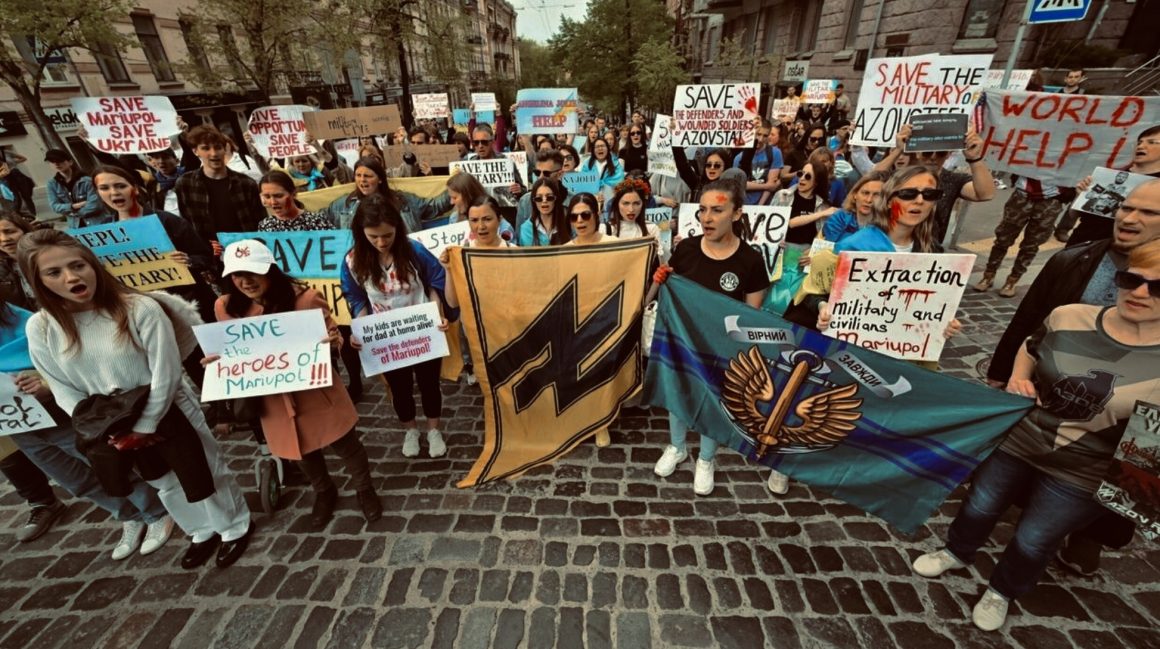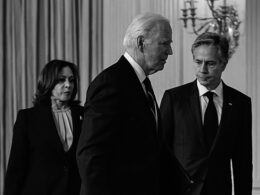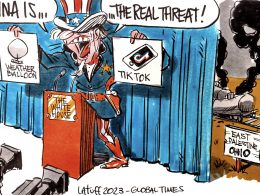The current conditions of the United States have a dual nature. The devastating impacts of the pandemic, the price inflations caused by the Russia sanctions, and half a century of growing inequality under neoliberalism have given the country’s people more potential for revolutionary radicalization than in generations. Yet due to factors behind those same crises, the American people are gripped with war fever, and by extension allegiance to the ruling institutions. The conflict in Ukraine may be exacerbating capitalism’s contradictions, but it’s also created an explosion in jingoism, xenophobia, and the other mentalities that are hostile towards revolution.
This doesn’t mean that the country will never undergo a revolution no matter how dire capitalism’s contradictions become. During the final years of Russia’s czar, World War I naturally created a rise in Russian nationalism, and this didn’t prevent the 1917 revolution. The war even created the conditions necessary for discontent to become irrepressible. But in America’s case, this reactionary impact that war has on mass consciousness is especially relevant to the question of whether a revolution will come. The U.S. is the center of global imperialism, and the super-profits it gets from this are used to placate the masses by letting them share in some of imperialism’s benefits. The more the U.S. empire declines, and the more capital contracts, the more these benefits get concentrated at the top, and therefore the more revolutionary potential the masses attain.
But deterioration of conditions don’t on their own bring revolution closer. What brings it closer is the education, organization, and mobilization of the masses, which war propaganda serves to frustrate. Understanding how this propaganda keeps a grip over the masses is instrumental for freeing them from its influence, and for strengthening the struggle.
Geopolitics as a domestic counterinsurgency tool
Under the rule of Washington, especially during the 21st century’s new cold war, geopolitics are inextricably intertwined with class and decolonial struggle. Because the U.S. empire has weaponized miseducation on geopolitics against revolutionary education. One can’t become adequately studied in Marxist-Leninist theory if they believe China is committing genocide against the Uyghurs, or the DPRK is a freedomless autocracy, or Cuba isn’t a democracy.
This applies to the people’s perspectives on more countries than these communist ones. If someone believes Russia is waging a war of aggression against Ukraine, despite an objective examination of international law showing its actions are justified by the responsibility to protect, their revolutionary potential will be limited. The view that Russia’s Operation Z lacks justification is central to the narrative that NATO, as well as its Nazi-influenced Kiev regime, require the world to accept. And accepting it undermines solidarity with the peoples of the Donbass, who are fighting for their independence from a government that’s explicitly threatened ethnic cleansing against them. Without international solidarity among peoples fighting for their freedom, the liberation struggle is weakened. Plus, an individual who believes the disinformation supporting this narrative—that Russia was behind the Bucha massacre, that Ukraine’s government isn’t influenced by Nazism, etc—is limited in their ability to become educated on the empire that subjugates them.
It’s for these reasons that the U.S. government, especially during the last decade or so of great-power escalations, is increasingly treating geopolitical propaganda as a counterinsurgency weapon. When the Smith-Mundt Act was repealed in 2013, officially legalizing covert propaganda being inserted into media U.S. citizens consume, Americans became awash in more pro-war content than they were during the previous cold war. Outlets like Vice News, formerly a major independent media source, became partnered with the state in promoting this propaganda. Which may explain output from Vice like its half-hour documentary “The Hermit Kingdom,” currently with over twelve million views, that frames the DPRK through the sinister lens suggested by the video’s title.
The more the cold war’s escalations progress, the more military strategists work on innovating in their psychological operations. In 2020, a NATO-sponsored report assessed that influencing the sentiments of large numbers of people, called “human” warfare, is now as important as sea, land, air, and cyber warfare. It assesses that “the goal of cognitive warfare is to turn everyone into a weapon,” as if acknowledging the ways Washington’s current geopolitical propaganda is frustrating radical organizing efforts. Now that the Xinjiang genocide narrative has likely been accepted by the majority of the U.S. population given survey evidence, revolutionary consciousness is more difficult to raise. Any solidarity that communists here express towards China can alienate someone who’s strongly embraced this or other anti-Chinese narratives. The propaganda war against Russia is having the equivalent effect. When communists express support for Operation Z, or merely push back against anti-Russian disinformation, they can easily be met with accusations of atrocity apologia.
The goal of these geopolitical psyops is to manufacture polarization and division by making the belief in the atrocity narratives highly emotional. Stories about Chinese guards “shooting to kill” detainees in supposed Uyghur concentration camps, or about Russia committing a “genocide” against Ukrainians, exploit people’s empathy. This is producing an environment of ideological pressure to accept these narratives, with the few who are skeptical getting potentially turned away from gaining revolutionary consciousness.
Cultural hegemony & rationalization as they apply to modern geopolitics
What the state is doing is fortifying the cultural hegemony which imperialism’s ideology depends on, and furthering our society’s rationalization of the present social order. Both are crucial for upholding capitalism, colonialism, and imperialism. Antonio Gramsci’s theory of hegemony says that the ideas which support the dominant social system are the ideas which the typical person won’t question unless prompted. How can they? It’s all they know. Max Weber’s theory of rationalization says that the actions a society takes are defined by the society’s culture, with Western society’s embrace of capitalism motivated by the Christian emphasis on a work ethic. This has translated into a cultural love for efficiency and productivity, and let Occidental society rationalize capitalism with its central drive for increasing profits.
In the modern, more secular context, capitalist rationalization has been increasingly dependent on a culture that worships not necessarily a god, but wealth itself. Which has been important for rationalizing neoliberalism, an ideology that justifies institutionally collapsing society by saying this is worthwhile for keeping profits up.
Now that colonialism and imperialism have imposed capitalism onto the vast majority of the rest of the globe, and a global anti-imperialist movement has emerged with the ultimate goal of shaking off capitalism, it’s natural that the imperial center’s cultural hegemony includes hostility towards all countries which defy imperialism. Capitalism in the imperial center is dependent on the continued exploitation of the Global South, so to maintain capitalism, there must be narratives that portray the defiant countries as sinister. When the cultural priority is profit, it’s perceived as in the best interests of society to correct the course of the countries that oppose imperialism. More importantly, it’s perceived as in the best interests of the individual, as individualism and its promise of self-created monetary success are central to capitalism’s cultural hegemony. Naturally, individuals become invested in the atrocity narratives, with their implicit mandate for assimilating the defiant countries back into imperialism’s grip.
Except this is only the broadest possible socioeconomic explanation for the grip that imperialist propaganda holds over the U.S. masses. No one consciously has a desire for profit as their motivation for believing in imperialist narratives. As Gramsci described, a dominant ideology’s existence is itself enough to make someone embrace it. This is evident in the dual nature of the class interests that a citizen of the imperial center has. All Americans may benefit from imperialism—as Confessions of an Economic Hitman’s John Perkins wrote, no American is fully innocent—but most of them are at the same time exploited by the bourgeoisie.
I say this with the awareness that such a way of talking about imperialism can be chauvinistic, that it can reinforce imperialism’s nationally self-centered view towards the world. The fact that this framing has crossed my mind while writing this essay speaks to how deep imperialism’s cultural hegemony goes. It shouldn’t be necessary to try to get Americans to oppose imperialism by pointing out that most of them are subjugated by capitalism. The mere reality that U.S. capitalism depends on the exploitation and slaughter of Global South peoples should be enough to convince any American to become revolutionary.
Such is the insidious way that imperialism undermines international solidarity among those within the imperial center. Because imperialist exploitation makes goods cheaper for the residents of the core countries, the imperialist ideology would say that we should react to our current price hike crisis not by turning against the U.S. empire, but by getting it to make the exploitation more intense. This is the implication behind the statements from cold warriors about how higher prices are the cost of “freedom.” If the war escalations causing these prices can’t be questioned, the only solution is to embrace imperialist ideology even more zealously, to defeat the Russo-Sino bloc that supposedly started the war and expand Western capital into a subdued Eurasia. Further austerity, privatization, and wage cuts in Washington’s existing neo-colonies are also necessary according to this mentality.
Because of this difficult-to-face reality that we in the core benefit from imperialism, selfishness indeed is a factor behind why Americans accept imperialist narratives. But again, it’s not a conscious factor, and the grievous costs to the U.S. masses of living under the empire shows that most people here only technically benefit from global exploitation. The U.S. masses have been living in a depression since 2008, perpetuated by the neoliberal policies of a capitalism that’s in crisis. One million Americans have died from Covid-19 due to the systemic ills that our socioeconomic system has created. There’s a globally unparalleled mass incarceration system, an ever deadlier police state, and a government that’s waging war against women’s rights. Most within the country objectively don’t have their primary interests staked in the continuation of capitalism, and its supporting system of imperialism. And the increasingly meager benefits that imperialism brings to them are miniscule in comparison to the living standard improvements which socialism would provide. Under workers’ democracy, the masses would be able to build wealth on the merits of their own labor, and not have the bourgeoisie dictate how that wealth is distributed.
Despite there being a superior alternative to the present social order, hegemony and rationalization keep the masses trapped in a worldview that says there is no alternative. That our present reality, and all of the even worse realities which capitalism may produce in the future, must be accepted out of lack of choice. There are of course also the visions of a resurgent American empire, or of an American empire that’s attained better conditions by ridding itself of what reactionaries consider “degenerate” culture. But these will never be anything more than liberal and fascist fantasies, born out of an intensified embrace of the country’s bourgeois, imperialist, and settler-colonial foundations.
As long as Americans don’t have solidarity with the peoples their empire attacks and exploits, they’ll remain victims of their own hubris, living under conditions that keep worsening the more capital contracts. The “price hikes are the cost of freedom” reasoning can’t be adequately challenged when the narratives justifying the war remain untouchable. Yet imperialist propaganda’s hold over the people is not invincible. People can break free from it. I have, and throughout my involvement in the anti-imperialist sphere, I’ve encountered countless others who also have. Even though doing so hasn’t necessarily made them unlearn their deeper reactionary habits, or come to the correct conclusions on every issue, they’ve shown the popular consciousness on imperialism can be changed.
The question is how to change it, which means not trying to figure out how to win over every last individual (that’s not possible) but identifying why those who remain obstinate in believing these narratives have taken that path. The reason they’ve taken it is ideology.
Assimilating the intellectual class into the ideological grip of empire
The individuals most likely to hold strong feelings on the countries targeted by imperialist propaganda are those in the intellectual class, or those who’ve absorbed information on a comparable level to this class. It’s an infamous fact within social psychology that just because someone is more educated, doesn’t mean they’re less prone to embracing untrue beliefs. An extensive education makes someone more assured in their being correct, and more inclined to dismiss challenges to their beliefs. Bourgeois education therefore functions as a tool to increase dogmatism and polarization, with these traits stemming from a character of elitism. The perceptions of the targeted countries that academics absorb through their courses, or simply through media osmosis, become unshakable due to how much time they’ve invested into gathering knowledge. It doesn’t matter whether the knowledge is true or not, what matters is that their delving into it represents their status as being educated.
Through this insular environment that pro-imperialist academia and journalism cultivates, our cultural hegemony is maintained. They provide the propaganda with a sense of unquestionability, even if the only effort they need to put in is compiling a list of imperialist media articles citing the same flawed studies, and symbolically giving it their approval as “experts.” This is what I’ve encountered from academics who’ve defended their stance on Xinjiang by citing the document Mass Detentions and Repression in Xinjiang: A Bibliography. The document justifies its extensive inclusion of links to news websites by saying that “The dividing line between ‘General information and commentary’ and ‘News reports’ is somewhat subjective.” But this comes across as a way of rationalizing its reliance on a fairly small series of statements and reports from individuals who not only have a vested interest in portraying China negatively, but put forth unreliable data that wouldn’t hold up to academic scrutiny in other contexts.
The infamously low number of interviews done by Adrian Zenz to support his assertions about Xinjiang is one example. As the China Watch Institute has assessed, “The so-called research findings published by Zenz and others are full of blatant data faking and fraudulent claims. They confuse speculation with hard facts, blur the lines between propaganda and academic research, and fabricate anti-China narratives based on ideology.”
The assimilation of the intellectual class into this ideology trickles down into the elements of the population that substantially consume what pro-imperialist intellectuals put out, either through academic papers or through media reports which cite these papers. As columnist Edward Curtin has written, what’s come from this is a fortification of the imperialist cultural hegemony, even as imperialism’s contradictions have intensified in recent decades: “Today most people are, as is said, ‘wired,’ and they get their information from the electronic media that is mostly controlled by giant corporations in cahoots with government propagandists. Ask yourself: Has the power of the oligarchic, permanent warfare state with its propaganda and spy networks increased or decreased over your lifetime. The answer is obvious: the average people that Lippman and Bernays [two of the U.S. empire’s guiding propaganda strategists] trashed are losing and the ruling elites are winning.” Curtin describes how these ideas gain such a strong grip over both the intellectual class, and negligibly studied individuals who consider themselves intellectuals:
This is not just because powerful propagandists are good at controlling so-called “average” people’s thinking, but, perhaps more importantly, because they are also adept – probably more so – at confusing or directing the thinking of those who consider themselves above average, those who still might read a book or two or have the concentration to read multiple articles that offer different perspectives on a topic. This is what some call the professional and intellectual classes, perhaps 15-20 % of the population, most of whom are not the ruling elites but their employees and sometimes their mouthpieces. It is this segment of the population that considers itself “informed,” but the information they imbibe is often sprinkled with bits of misdirection, both intentional and not, that beclouds their understanding of important public matters but leaves them with the false impression that they are in the know. Recently I have noticed a group of interconnected examples of how this group of the population that exerts influence incommensurate with their numbers has contributed to the blurring of lines between fact and fiction. Within this group there are opinion makers who are often journalists, writers, and cultural producers of some sort or other, and then the larger number of the intellectual or schooled class who follow their opinions. This second group then passes on their received opinions to those who look up to them.
Curtin points to Bellingcat, the U.K. research group that’s funded by the neoconservative think tank the Atlantic Council. Despite Bellingcat’s work being widely skewered for uncritically endorsing the NATO Syrian war proxies the White Helmets, and for reinforcing disproven war propaganda narratives like the 2018 Douma “Assad chemical attack,” the group has received ample praise from these driving intellectual figures. Bellingcat is seen as trustworthy not because it actually is, but because it’s gotten designated as trustworthy. And those who believe what Bellingcat says are designated as belonging to an enlightened class. Imperialist propaganda encourages hubris, telling the imperial center’s residents that the narratives supporting the present social order aren’t just materially beneficial to them. They’re the ideas that society’s most respectable people hold, with the only ones who reject them being fools who’ve fallen for conspiracy theories and foreign propaganda.
With the military growing its collaboration with academia, according to the 2020 NATO-sponsored report, there’s a conscious effort to weaponize this hubristic mindset which bourgeois intellectualism is built on. The counterinsurgency’s strategists seek to cultivate imperialist ideology within the circles that are oriented around studying economics, geopolitics, history, and the other topics that pertain to class struggle.
This is effectively an effort to prevent the emergence of a vanguard by directing potential revolutionaries towards pro-imperialist ideas. As Lenin said, “A party is the vanguard of a class, and its duty is to lead the masses and not merely to reflect the average political level of the masses.” The average person has a surface-level understanding of geopolitics, including of the narratives about geopolitics that the imperialists put forth. So should the power structure change, they’ll be able to unlearn imperialism’s narratives fairly easily. But the minority of the population which makes up the intellectual class, the elements which are politically engaged on a substantial level, are more susceptible to becoming obstinate adherents to imperialism’s narratives. And it’s these elements that can fill the role of the vanguard, of those who organize and educate the masses. The more this minority is influenced by imperialist ideology, the more the effort to create an effective vanguard is frustrated, and the more the average people lose.
It’s for this reason that in order to bring revolution, communists must prioritize ideological struggle, like Russian communists such as Lenin did. Pre-revolutionary Russia had no shortage of opportunists, revisionists, and others who sought to distort or vilify Marxism for their own gain. And the nature of today’s U.S. empire has made our current versions of these actors take on their own unique forms. Forms we need to understand in order to best combat their ideas.
Manufacturing a synthetic left, & a flawed Marxist opposition to it
When someone’s political development has been successfully influenced by imperialist propaganda, to the effect that they go from a potential revolutionary to a hindrance towards the revolution, it’s crucial that they believe their own perception of what’s “revolutionary” is aligned with what’s best for the masses. Since helping the masses is the central goal of any revolutionary, they wouldn’t be able to rationalize calling themselves revolutionaries otherwise. It’s this psychological roadblock towards critical self-examination, telling one that they don’t need to revise their thinking because the masses may as well already be on their side, that produces dogmatism. And when dogmatism is used to fortify belief in imperialist narratives, obstinate embrace of imperialist ideology becomes easy.
This is why the atrocity narratives are frequently accepted not just by academics or pundits, but by those within the imperial center who’ve entered the scene of radical politics. The belief that Russia and China are imperialist powers, despite these countries both lacking the socioeconomic character that would make them imperialist, is overwhelmingly embraced by sectarian factions such as Maoists, anarchists, Trotskyists, and other non-Marxist-Leninist ideological strains. This perception that the current great-power tensions are an inter-imperialist conflict informs every other geopolitical stance that these factions take. Their stances tend to consist of imperialist propaganda filtered through a leftist lens, such as “the countries ruled by communist parties are all state capitalist,” “Assad is an authoritarian who opposes the YPG’s anarchist project,” or “Operation Z is nothing but a capitalist war effort that should be opposed.”
These three analyses respectively ignore that Marxist theory has substantial basis for utilizing markets for building productive forces, that the YPG is fighting for a Kurdish supremacist project which has committed ethnic cleansing, and that it was Russia’s communist party which initially urged Putin to intervene in Ukraine out of desire for combating the Banderite fascists. But they’re all major aspects of the beliefs of these factions. They can collectively be considered the “synthetic left,” the individuals who began developing towards revolutionary consciousness and then got diverted into imperialist ideology to some capacity or another. In a recent Quora essay, Hoàng Phan, a Vietnamese communist who studied at a U.S. university and was likely exposed to these strains, had this to say about them:
Many people still don’t know that a lot of these online self proclaimed “leftists” / “communists” / “nationalists” etc are literal Western regime shills (”Liberal CIA” Network of ”New Left” Foundations, Media, Activism). The “anarchism” movement in decaying Anglo regimes is a regime op (In COINTELPRO, FBI used anarchism to ‘disrupt left’, attack Vietnam & USSR). The regime is actually recruiting “anarchists” and even encourages the “new left” – here is more context (https://archive.vn/2p1lN) with examples of the literal “anarchist” fed propaganda funded by the regime. In the article, they are talking about people like Stokely Carmichael, and the Pan-African movement. If anyone falls for the “the regime is prosecuting anarchists” narrative, they are beyond naive. It’s an undisputed historical fact that shows how the Amerikkkan regime uses “anarchists” to spread regime propaganda and destroy any real dissent in tyrannical Anglo societies.
Phan is referencing a story about how during the radical movements of the 1960s and 70s, FBI Counterintelligence Program agents posed as anarchists, and created fake “anarchist” publications which attacked the Soviet Union. The FBI also applied this tactic by sending infiltrators to pose as Maoists. No doubt there have been plenty of FBI agents who’ve posed as Marxist-Leninists as well, but their roles have been either to divert the movement away from Marxist-Leninist ideas (such as support for existing socialism) or to pretend to hold those ideas for wrecker purposes. The invariable goal of the state’s counterinsurgency, at least in the ideological realm, is to discredit Marxism-Leninism.
Which not coincidentally aligns with the U.S. empire’s current foreign policy agenda. The ultimate goal behind every provocation that Washington carries out in this era is to weaken China, the world’s largest Marxist-Leninist state. Washington’s destabilization operations in Africa are for destroying the states which could trade with China, Washington’s sanctions against Afghanistan are about keeping Eurasia too unstable to be overtaken by the China-led multipolar order, and Washington’s proxy war against Russia is about destabilizing China’s biggest strategic ally. China has become Washington’s biggest economic threat because its government is communist, and therefore resists on principle all attempts to make the country into a neo-colony or a proxy for imperialist designs. So China’s rise, anticipated by analysts as far back as Napoleon, poses a threat to imperialism. Marxism-Leninism has by extension become the biggest threat to imperialism geopolitically, in addition to in terms of domestic political dissent within the capitalist countries.
Repudiating American exceptionalism, the ideology that’s central to imperialism’s cultural hegemony and capitalist rationalization in our society, is therefore synonymous with upholding Marxism-Leninism. It’s under this reasoning that some communists within the U.S. have been attacking the “synthetic left,” pointing out its hypocrisy and selfish loyalty towards imperialist ideas. But these communists are also taking ideological guidance from Caleb Maupin, the polemicist who coined the term “synthetic left” and has come to flawed conclusions despite being correct in diagnosing that particular problem. The argument posed by Maupin’s think tank the Center for Political Innovation, and its adjacent tendency, is that those within the U.S. should be patriotic for their country.
This stance is informed by the perception that every call to abolish the United States originates from the synthetic left, that the idea of doing away with settler-colonial land relations is purely a concoction of left academics who are detached from the masses. But this perception comes from that same dogmatic assumption about one’s own ideas being necessarily aligned with the interests of the masses. It’s not in the interests of the masses to oppose full self-determination for the U.S. empire’s internal colonies, because those internal colonies make up major elements of the masses. Elements with far more revolutionary potential than the petty bourgeoisie and labor aristocrats who are most likely to be attracted to U.S. patriotism.
Rejecting the idea of returning full jurisdiction over to the tribes, and giving these tribes the opportunity for negotiating land relations with the other oppressed nations, will produce unnecessary division. And if one’s concern is that doing so will lead to the continent’s balkanization, leaving socialism vulnerable to counterrevolution, there are routes towards decolonization which don’t involve balkanization. It’s entirely possible to create a federation of unified post-colonial nations, building socialism in the equivalent way to how the USSR’s Soviets worked together. Such an idea is the logical conclusion of an analysis of the continent’s unique conditions, as opposed to the idea of trying to perfectly replicate Russia’s socialist model and create a “USSA.” As Marxism-Leninism emphasizes, different solutions must be reached for different conditions. Just because a post-colonial federation would be analogous to the USSR, doesn’t mean it would be identical. And trying to make it identical will end in failure.
The counterargument from the “patriotic socialist” camp is that such a decolonial project simply isn’t feasible. But post-colonial states exist around the globe. All of the Asian socialist countries had to throw off colonial occupiers before they could build socialism, as the occupied nations here will need to do before workers’ democracy can come to this continent. The insistence that anti-colonial liberation struggle can’t happen here is another manifestation of American exceptionalism, designed to rationalize internal imperialism. The U.S. empire’s internal colonies are subjugated and exploited, if in a different way than the external ones. Therefore the resolution of contradictions will entail their overthrowing colonialism, and ending settlerism in the process. Arguments against this that come from a Marxist lens may claim to be dialectical, but their disregard for these material and historical realities shows this not to be the case. They’re a form of class reductionism, of assuming all issues will be adequately addressed purely by focusing on class.
And class reductionism, like all other ideologies which reinforce the existing social order, are a product of our cultural hegemony. Because Americans are brought up believing their country is legitimate, this belief by default becomes the conviction of even many who call themselves Marxists. These right-wing deviationists are another example of how our cultural hegemony distorts revolutionary theory, and converts intellectually interested individuals who would otherwise be qualified members of a vanguard. This shows that the mentality required for fighting imperialist narratives, when it comes to both external and internal imperialism, is informed by the phrase “you are not immune to propaganda.” Imperial chauvinism is insidious, and can influence even those who believe themselves to be best at fighting imperialist narratives. Rejecting it is dependent on avoiding hubris, and always being willing to question one’s existing beliefs. Through this critical self-examination, we can perpetually sharpen our abilities to advance the revolution.
—————————————————————————
If you appreciate my work, I hope you become a one-time or regular donor to my Patreon account. Like most of us, I’m feeling the economic pinch during late-stage capitalism, and I need money to keep fighting for a new system that works for all of us. Go to my Patreon here.








